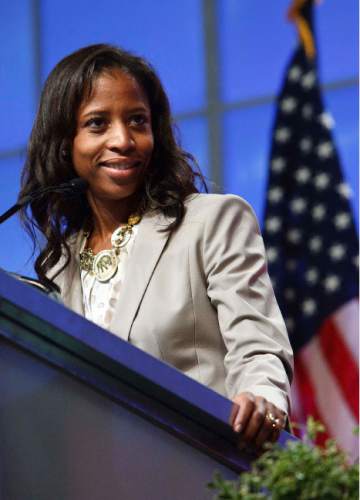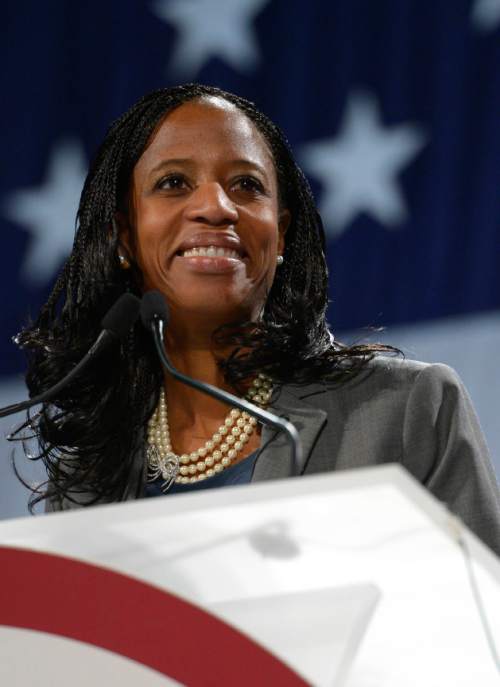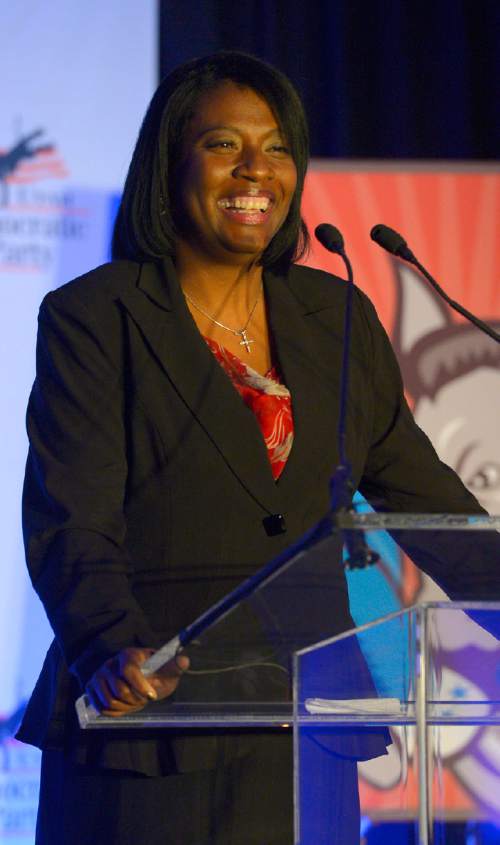This is an archived article that was published on sltrib.com in 2015, and information in the article may be outdated. It is provided only for personal research purposes and may not be reprinted.
A Utah minority group has finally managed to elect as many or more members to Congress and the Legislature than its share of the population would predict.
It's not Latinos, Pacific Islanders, Asians or American Indians.
It's blacks. They account for 1.3 percent of Utah's population, but, after the past election, they now have:
• 16.6 percent of Utah's congressional delegation, one of six, thanks to the election of Republican Rep. Mia Love. She takes office Tuesday as the first Republican woman in Congress in U.S. history and the first black elected there from Utah.
• 3.4 percent of the state Senate, or one of 29 senators. Sen. Al Jackson, R-Highland, won a battle among GOP delegates to decide who would fill the seat of Sen. John Valentine, who resigned to become a member of the Utah Tax Commission. Jackson is the third black Utahn to serve as a state senator.
• 1.3 percent of the Utah House, or one of 75 representatives. Incoming Rep. Sandra Hollins, D-Salt Lake City, is the first-ever black woman elected to the Legislature and the fourth black to serve in the state House.
• 50 percent of the major political party state chairmen. James Evans, a former state senator, heads the Utah Republican Party.
Meanwhile, Utah Pacific Islanders and American Indians have no members elected to such positions.
Latinos have no members of Congress but have 3.4 percent of the Utah Senate and 4 percent of the state House — well below their 13.4 percent of Utah's population.
Asians, who make up 2.3 percent of Utah's population, have no members of Congress but do have 3.8 percent of the state Senate and 4 percent of the state House.
"It's a big change in Utah," Hollins said about blacks winning such seats. "As the landscape of America has changed, I think the landscape of Utah has changed. And I think our elected officials are going to start reflecting that change."
As Love told supporters on election night, "Many people said Utah would never elect a black, Republican, LDS woman to Congress. And guess what ... we were the first to do it."
Most of Utah's black politicians credit their success to voters being willing to pay more attention to their message than race.
For example, Love tweeted last week before taking office, "I wasn't elected because of the color of my skin. I wasn't elected because of my gender. I was elected because of the solutions I put on the table."
Jackson said, "Everyone's fair to everyone here. People are judged by the content of their character more than their skin color. That's been enlightening to my family."
But Hollins said while the message is most important, race matters.
"As long as it is part of our culture, it [race] will play a part in politics," she said. "We all need to be having a conversation about it. It's not something we should shy away from. I think the more we talk about it and put it out there, the more we are better able to understand each other."
Jackson said blacks may offer new faces and new points of view that attract Utahns.
"People like fresh and new. When you look at Utah politics, it's usually the same old people who run every time, the same old names," he said. "People are looking for new things."
Evans said more black may be elected here because more blacks are embracing the Republican Party.
"I get emails and phone calls from around the country from blacks asking how we are doing this," he said. "My response is: 'You guys need to make sure you have a Republican-dominated state, and you will see these things happen.' "
Evans is from South Carolina "from that period when Democrats controlled the South. So my experience with Democrats is different than perhaps others because it was that group that enforced segregation and vestiges of Jim Crow."
"For the last 40-plus years," he said, "I think the black community has been wandering, looking for solutions," and more are finding them in the GOP.
Hollins, a Democrat and New Orleans native, disagrees, saying blacks are active in both parties here. She said success of blacks in both parties — including, of course, President Barack Obama — will encourage more to run.
"It's something that the black community takes great pride in, that there are political officials that look like them and reflect their point of view that are out in the forefront," she said. "I think we are going to see more people of color who are going to start running for office."
Interestingly, Evans, Hollins, Jackson and Love all were raised out of state and are not Utah natives. They say they have been treated well here, but not perfectly.
Jackson, who was reared in the Washington, D.C., area, said when he first visited his wife's relatives in Utah in the 1990s, "people just assumed that I played basketball for the Jazz. It was funny."
He notes he is tall and did play college basketball at Embry-Riddle Aeronautical University in Florida.
Hollins said, while Utah has been good to her family, "have we had to deal with some issues regarding race, and have I had to deal with some issues with me being a woman? Absolutely. But my family and I have chosen to remember those people who are good to us."
Hollins is surprised that she is the first black woman elected to the Utah Legislature and perhaps even more stunned that incoming Sen. Jani Iwamoto, D-Holladay, is the first Asian woman elected there. "I thought that would have happened by now."
The group expects many more minorities to follow them. "I hope this serves as an inspiration to kids of color," Jackson said, "that they can achieve those kinds of positions." —
Mia Love's date with history
Washington • Utah's Mia Love will make history Tuesday, when she is sworn in as the first black female Republican member of Congress.
In addition, longtime Sen. Orrin Hatch will take on a larger role as the president pro tempore of the Senate, a role that puts him third in line of presidential succession.
Congress gavels into session Tuesday at 10 a.m. MST, and new and returning members will be sworn in shortly thereafter.
Love, who was elected in November in Utah's 4th District, will join her fellow representatives on the House floor to take the oath of office.
The Beehive State will have an all-GOP delegation for the first time in 14 years.
Hatch, as the senior Republican in the new GOP-run Senate, takes over as stand-in for the Senate president: Vice President Joe
Biden, who rarely comes to Capitol Hill.
Thomas Burr









